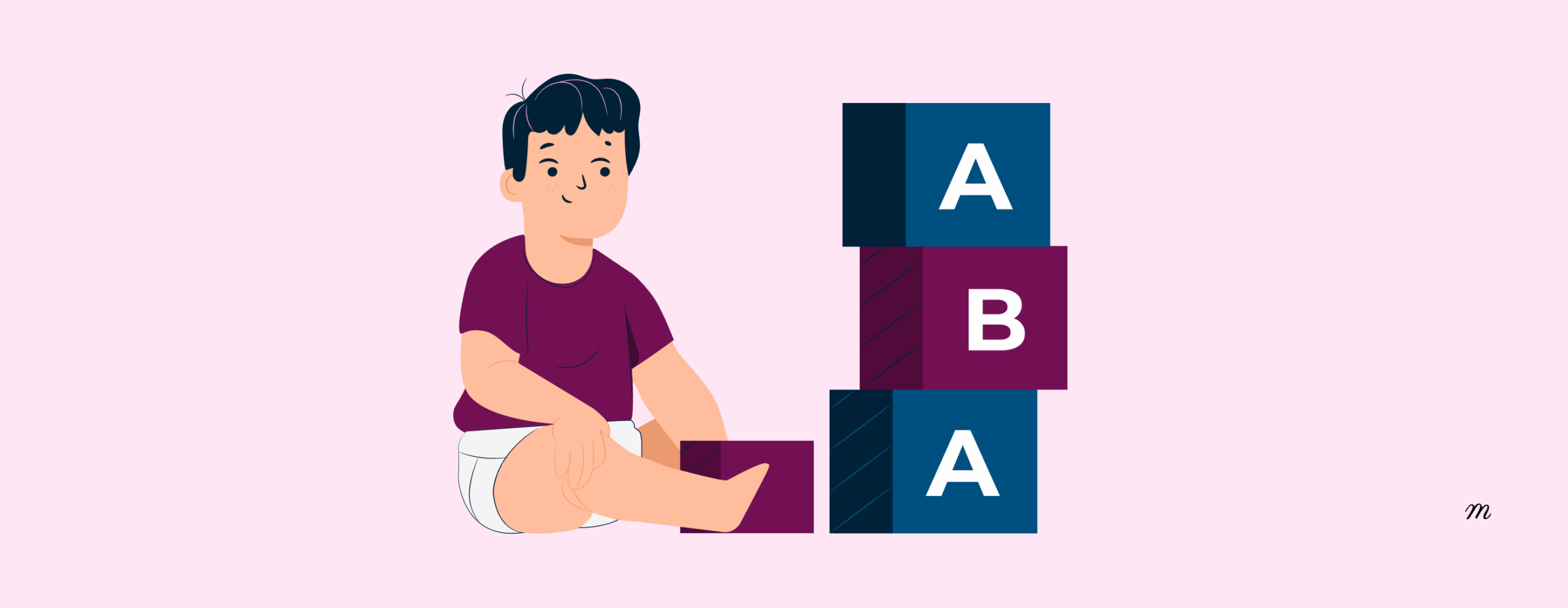You finish the session feeling good about the progress made – then comes the part no one looks forward to. Writing the ABA notes.
That’s why more and more ABA professionals are turning to tools that make life easier. An ABA Notes Generator helps turn that blank page into clear, structured, professional notes in minutes. Less stress, less wasted time, and more focus on what really matters—delivering great therapy.
What Are ABA session notes?
ABA session notes are simply the written record of what happened during a therapy session using Applied Behavior Analysis (ABA). They’re usually written by the therapist—whether that’s a Board Certified Behavior Analyst (BCBA) or an Registered Behavior Technician (RBT)—and they help track progress, share information with the care team, and keep everything consistent. Writing them can be time-consuming, but tools like an ABA Session Notes Generator make the process faster and easier while keeping the notes accurate and professional.
Key Features of ABA Notes Generator Apps
When it comes to ABA documentation, clinicians need more than just a tool to create notes – they need a tool that keeps everything secure, efficient, and clinically useful. That’s why an ABA Notes Generator needs to be designed with all the essential features below – and even more to support your daily workflow.
| Feature | Description |
| HIPAA Compliance | Ensures secure and confidential data handling. |
| Customizable Templates | Allows therapists to adapt notes to their approach and workflow. |
| AI-Powered Automation | Reduces manual work by generating complete notes automatically. |
| Progress Tracking | Monitors client progress toward therapy goals. |
| EHR Integration | Easily exports data for use with electronic health record systems. |
There’s an ABA Notes Generator – Mentalyc, that not only ticks all the boxes but also goes beyond compliant and high-quality notes by providing actionable insights to help you grow as a therapist.
Writing ABA notes fast – ABA session documentation best practices
Writing down the ABA therapy session notes can be very time-consuming, but there are some strategies you can use to write them more efficiently:
Develop and Use An ABA Session Note Template
Create a template for your notes that includes the necessary sections, for example, the name of the client, the date and time of the session, and any sort of specific goals or objectives for the session. With this template, you can organize your thoughts and make sure that you have included all of the necessary information.
Ready-made templates like these are available in tools like Mentalyc, and they are fully customizable to suit your client’s unique needs, your therapeutic approach, and the specific requirements of each session.
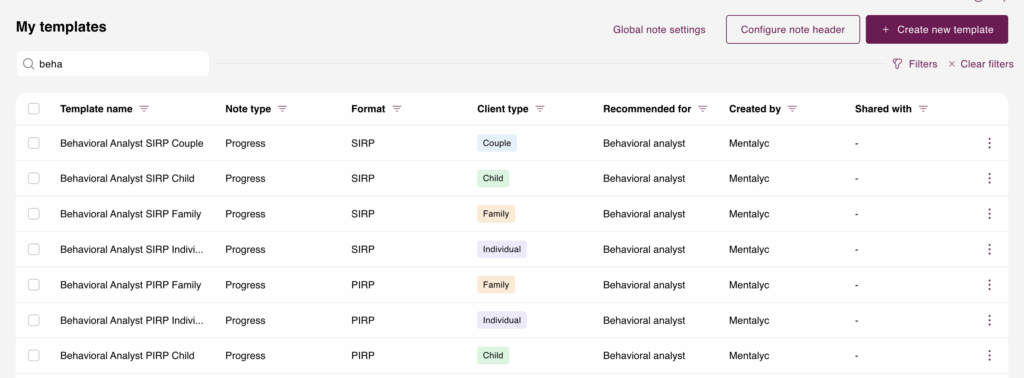
Make use of bullet points
Make use of bullet points to break down your notes into smaller and easier-to-read chunks. This will allow you to stay organized and ensure that you have included all the necessary information. Many therapists use ABA note-taking apps to facilitate this process.
Utilize technology for Automated ABA Session Notes Generation
Use a good tablet or a laptop to take your notes during the session, and utilize software that will allow you to record session and generate notes, like the Automated ABA session notes tool. Mentalyc is one example of AI ABA notes generator, helping clinicians quickly organize session data and generate clear, accurate ABA notes without the extra hassle.
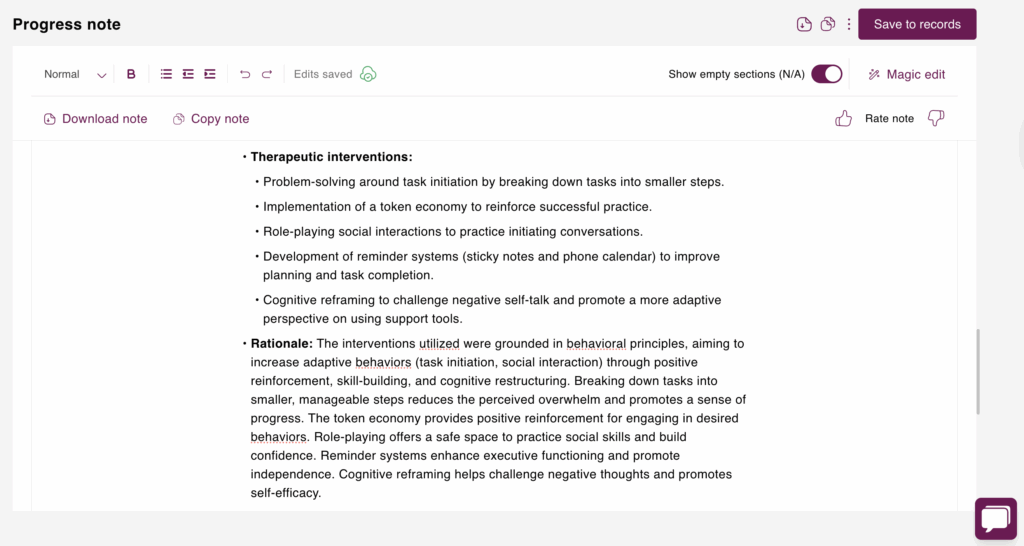
ABA Notes Generator – what is it?
An ABA therapy session notes generator is a tool that automatically generates session notes for therapy sessions conducted using Applied Behavior Analysis (ABA) techniques. This tool is designed to help therapists, such as Board Certified Behavior Analysts (BCBAs) and Registered Behavior Technicians (RBTs) save time and minimize manual data entry when documenting therapy sessions.
The ABA documentation software automatically organizes session details using a structured or customizable template. It captures key information such as session date and time, the client receiving therapy, goals and objectives, and behavioral observations or progress notes – without the need for manual data entry.
In the Mentalyc – HIPAA-compliant ABA note-taking software, you can capture your session in multiple ways: by typing, uploading files, recording during in-person or telehealth sessions, or dictating your notes.
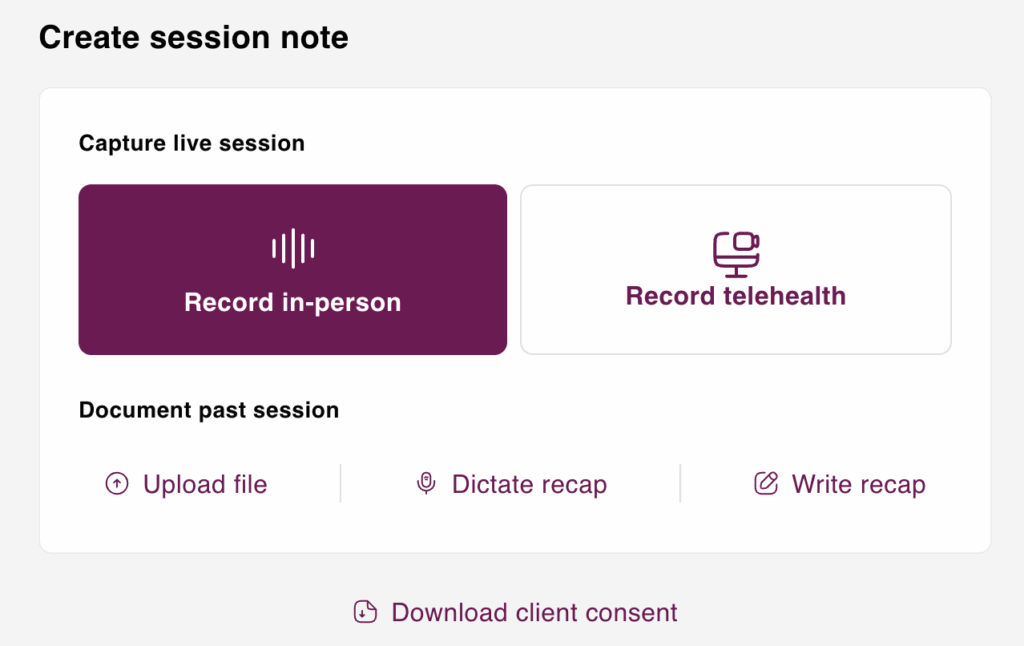
Manual Note-Taking vs ABA Notes Generator
By using the ABA progress note generator, therapists can save time and create session notes that are more accurate, complete, and consistent. They can also reduce the risk of errors or omissions in session notes, which can be important when documenting progress and making decisions about future therapy sessions.
Additionally, it streamlines communication with other professionals, ensures compliance with documentation standards, supports data-driven decision-making, and allows therapists to focus more on client care rather than paperwork.
| Feature | Manual Note-Taking | ABA Notes Generator |
| Time Required | High (20–30 mins/session) | Low (2–5 mins/session) |
| Accuracy | Varies | High and consistent |
| Risk of Errors | High | Minimal |
| HIPAA Compliance | Manual responsibility | Built-in compliance |
| Customization Options | Limited | High |
Benefits of using AI-powered ABA Progress Note Generator
With so many benefits already mentioned, here are some key advantages of using an ABA clinical notes generator:
It will save time
An ABA therapy documentation automation web app saves hours of paperwork with an RBT session notes generator that turns pre-set templates into complete session notes – so therapists can spend less time documenting and more time delivering impactful therapy.
Your notes will always be consistent
Writing consistent notes can be one of the trickiest parts of ABA therapy documentation for RBTs. The automated ABA session notes generator ensures that your notes are consistent every time by using standardized templates and forms. This consistency is especially valuable when multiple therapists are working with the same client, helping the whole team stay aligned and maintain clear, organized documentation.
Your notes will be accurate
Digital ABA data collection and reporting takes the guesswork out of session documentation. By automatically generating reports from the information therapists enter, it creates error-free automated clinical notes that are complete, precise, and reliable – making it easier to track progress and make informed decisions for future therapy sessions.
These Progress Note Automation Platforms are easy to use
It’s essential that an ABA note tool is easy to use, and we can confidently recommend Mentalyc. It is a leading solution for HIPAA compliance in therapy software, combining a user-friendly design with the highest level of data security. All clinicians can use it effortlessly, even without much experience with technology.
It will improve communication among therapists
This mental health documentation software enhances communication among therapists and other professionals involved in a client’s care. By providing standardized note formats that can be easily shared and reviewed, it ensures that everyone is on the same page and working toward the same goals.
Additionally, some tools are designed to work seamlessly with your EHR system. For example, Mentalyc offers a Chrome extension that lets you transfer notes directly into your EHR with just one click.
Mentalyc’s ABA Note example
With the ABA notes generator, writing session notes becomes easier, faster, and more consistent. Tools like Mentalyc captures key details from your session, organizes them into professional formats (such as SOAP, DAP, or BIRP), and ensures your documentation stays clear, objective, and compliant.
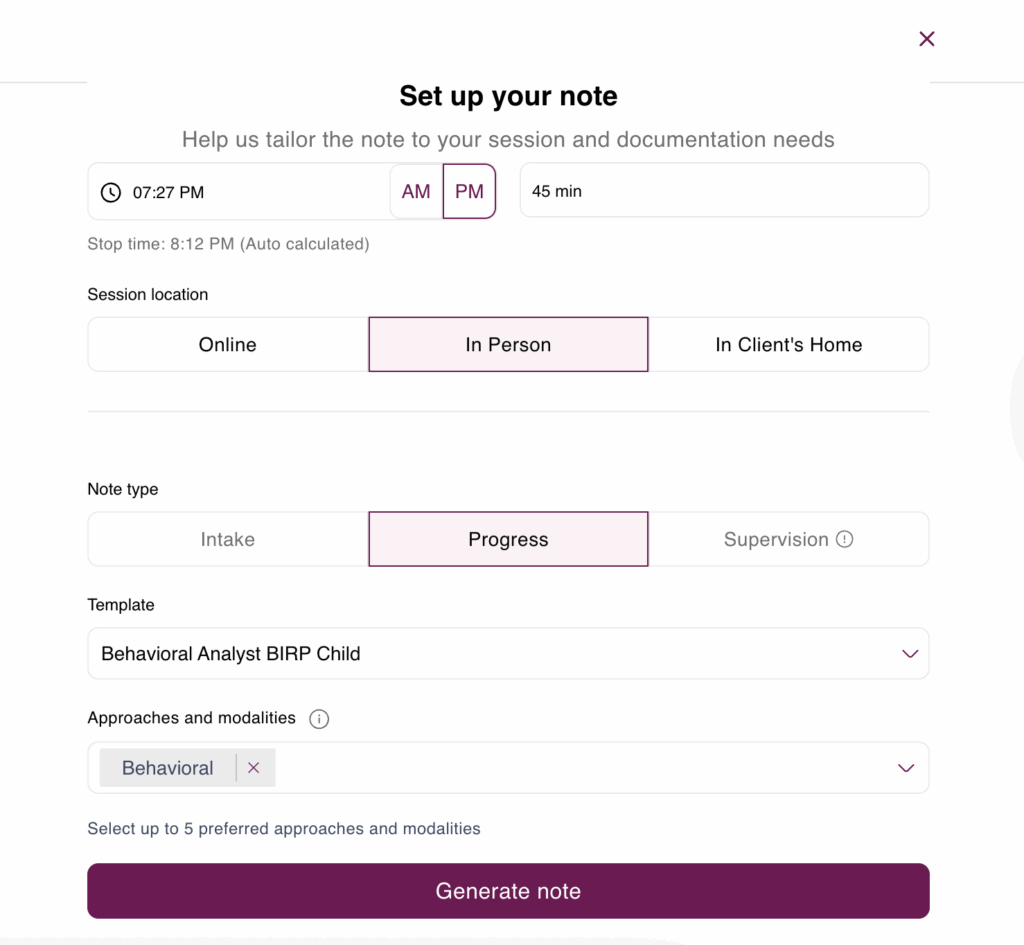
Mentalyc’s note example (BIRP)
See AI-powered ABA notes in action with Mentalyc. This example uses a BIRP format with a clear bullet structure, but you can also choose a more narrative-style option—or switch to SOAP, DAP, and other note types—to fit your preferred workflow.
- Name: Brian
- Age: 5
- Gender: M
- Client Type: Child
- Session date: September 2, 2025
- Start/Stop time: 07:27 PM – 08:12 PM
- Session duration: 50 minutes
- Place of service: In Person
- CPT code(s): 90847, 90834
Brief summary of session: The client participated in a two-hour home-based therapy session focused on communication, compliance, and social skills development. He initially displayed reluctance to transition to the therapy area but engaged after prompting and reinforcement. Progress was observed in manding (requesting), with the client independently vocalizing “ball” and “cookie. ” Receptive identification skills also improved, with accurate identification of three out of five household items. Challenging behaviors (crying, dropping to the floor) occurred twice during transitions but were managed with redirection and visual supports. These behaviors were reduced in frequency and intensity compared to the previous week. Natural environment teaching during snack time facilitated practice in requesting items, and the client successfully combined word and gesture twice. Social skills practice involving turn-taking showed initial difficulty, but the client tolerated waiting with minimal protest after hand-over-hand support. Overall, gradual progress was made toward communication and compliance goals, with ongoing challenges around transitions and waiting. Future sessions will emphasize spontaneous verbalizations, expand receptive vocabulary training, and continue structured turn-taking practice. The parent was updated on session progress and encouraged to reinforce communication attempts.
BEHAVIOR
Presentation:
- Chief complaint: The client presents with challenges in communication, receptive identification, and transitioning between activities. He also exhibits challenging behaviors during transitions.
- Impairments and challenges: The client’s communication and behavioral challenges impact his ability to effectively request desired items, follow instructions, and engage in social interactions. This may affect his daily routines, learning opportunities, and social development.
Psychological factors:
- Symptoms:
- Symptom 1:
- Description: Challenging behaviors, including crying and dropping to the floor, are observed during transitions.
- Onset: Typically occurs when transitioning away from preferred activities to structured tasks.
- Frequency: Twice during the session.
- Ascendance: Decreased frequency and intensity compared to the last week.
- Intensity: Moderate, lasting under two minutes each time.
- Duration: Under two minutes for each instance.
- Quote (symptom): Client stated “No, I don’t want to” before dropping to the floor.
INTERVENTION
Interventions:
- Therapeutic approach or modality: Behavioral Therapy
- Therapeutic interventions: Structured teaching trials were used to target manding and receptive identification. Redirection, visual supports, and reinforcement were implemented to manage challenging behaviors. Natural environment teaching was incorporated during snack time to practice requesting items. Hand-over-hand support was provided during turn-taking practice.
- Type of play: The session included structured play activities focused on skill development, as well as natural environment teaching embedded within a snack time activity.
- Materials used:
- Common household items.
- Preferred toys.
- Visual supports.
RESPONSE
Progress and response:
- Response to treatment: The client responded positively to reinforcement with praise and preferred toys, which maintained his motivation throughout the session. He also demonstrated progress in manding and receptive identification, and showed some improvement in turn-taking with support.
- Progress towards goals: Progressing
PLAN
Discussed goals:
- Barriers to achieving goals: Transitions and waiting present challenges for the client.
Follow-up actions and plans:
- Homework: Parent was encouraged to reinforce communication attempts during daily routines.
- Plan for future session: Future sessions will focus on increasing spontaneous verbalizations, expanding receptive vocabulary training to include action words, and continuing structured turn-taking practice.
- Plans for continued treatment: Therapy will continue with a focus on communication, compliance, and social skills development.
- Coordination of care: Parent was updated on session progress and encouraged to reinforce communication at home.
The Bottom Line: Streamline Your Documentation with ABA Notes Generator Tools
Customizable ABA note-taking tool empower clinicians to capture session details quickly and efficiently, producing notes that are clear, accurate, and actionable. By combining speed with thoroughness, these tools make documentation simpler while supporting better clinical decision-making.
One such tool is Mentalyc, which streamlines documentation, saves time, and helps clinicians focus on providing high-quality care rather than getting bogged down in paperwork. It allows you to create detailed ABA notes effortlessly, making session tracking and reporting much easier.
See how Mentalyc is already making a difference in real practices:
Why other mental health professionals love Mentalyc
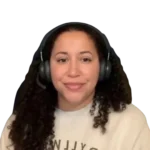
“I’m able to move in and out of doing my notes within that small five-minute gap between sessions. I’m able to keep compliance and rest assured everything is covered.”
Licensed Clinical Social Worker

“It’s so quick and easy to do notes now … I used to stay late two hours to finish my notes. Now it’s a breeze.”
Licensed Professional Counselor

“It immediately changed my quality of life, personally and professionally.”
Owner/Independently Licensed Marriage & Family Therapist (LMFT)

“If I were recommending this software to a colleague, I would tell them that it is the best thing that they could do for their practice.”
Licensed Professional Counselor
Mentalyc Pricing Plans for ABA Note-Taking (For Solo Practice)
| Plan | Price | Key Features |
| 14-Day Free Trial | $0 | 14 days of full PRO access, including 15 notes—no credit card required. |
| Mini | USD 14.99 /month | Record in-person sessions, upload audio files, use voice-to-text, or type notes directly, etc |
| Basic | USD 29.99 /month | Everything in Mini, plus:Alliance Genie™ NEW! (limited access), Smart TP™ |
| Pro | USD 59.99 /month | EMDR, Play and Psychiatry modalities, 100+ custom templates incld. BIRP, PIRP, GIRP, PIE, and SIRP, Auto-computed CPT codes |
| Super | USD 99.99 /month | Everything in Pro, plus: Group therapy notes for each group member, Priority onboarding and support |
For more details, visit the pricing page.
